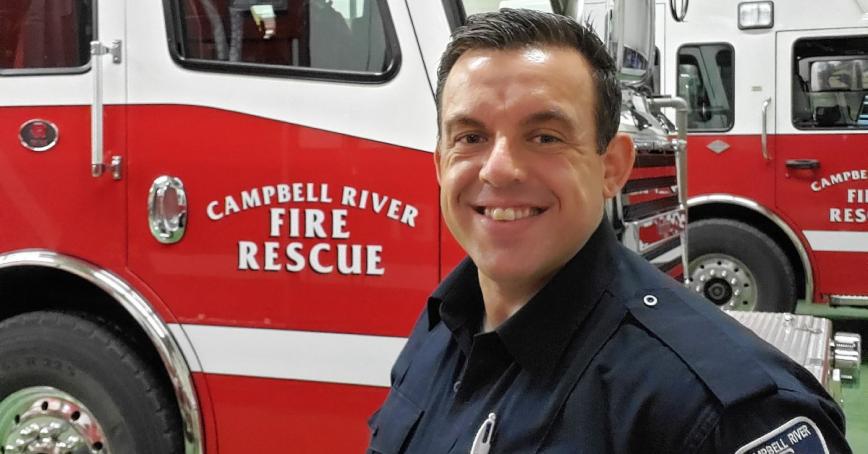Casting a wider net for future firefighters
Topics
Featured
Share online

Learn more about the Master of Business Administration in Executive Management program.
Listen to Jesse Challoner's recent CBC interview with Gregor Craigie On the Island.
When Jesse Challoner worked as a firefighter in Strathcona County, AB, he saw the first woman hired for the job.
“Some reactions were hard to witness, because there was significant resistance to change,” recalls the 20-year veteran firefighter and advanced-care paramedic. “What she had to go through to prove herself versus what her male counterpart had to go through was very different.”
Since that time, Challoner moved to the Campbell River Fire Department. He has seen many technological improvements in the industry, but fewer cultural improvements.
“We really only have one shade making up the majority of the fire service, and that caused me to raise a bit of an eyebrow,” says Challoner. “I'm not in management. I’m an operational firefighter, and I work on the frontlines. But I tend to have a bit of a proclivity to look up and out to see where we're at, and where we could be.”
That desire led him to Royal Roads University. This month, he convocates with a Master of Business Administration in Executive Management, and will be awarded the Governor General's Gold Medal, for the student with the most outstanding graduate work.
For his graduate project, Challoner looked at how recruitment practices can reach underrepresented groups.He chose to study the Victoria Fire Department as one dedicated to making change. Marketing and advertising is a big piece of the puzzle, he says of his research.
“If we run down to the local hockey rink, we’re looking for athletes with a team-based mentality, but we’re also going to find mostly affluent, Caucasian families who have access to the sport.”
Instead, fire departments could be connecting with ethnic community groups, or school groups such as SOGI clubs, says Challoner. “One of the adages we throw around all the time is ‘you can't be what you can't see’. So, are we being seen by these groups as a legitimate option?”
Challoner’s research uncovered other ways to level the playing field. For example, the fire service could host open houses, catering specifically to women or the BIPOC community, to come and ask questions and try out the gear.
Challoner says another example is the physical aptitude test. It could stop giving preference to the strongest and fastest candidates, and instead implement a pass-fail system based on a benchmark set by the requirements of the job. While being fast and strong is important, firefighters need a broad skill set to be effective, says Challoner. That includes emergency medical services, technical rescue, public education and more.
“There are some easily accessible recommendations that could be implemented right away at very low cost,” says Challoner, explaining there are already firefighters on the floor prepared to join committees dedicated to this work.
 Armed with his new degree, Challoner is hoping to move his career into spaces where he can help shape the training and recruitment process to be more equitable, diverse and inclusive.
Armed with his new degree, Challoner is hoping to move his career into spaces where he can help shape the training and recruitment process to be more equitable, diverse and inclusive.
Morally, it’s the right thing to do, says Challoner. But that’s not his only motivation. The research also shows that a heterogeneous workforce improves outcomes. Emergency response agencies should reflect the community they serve, he explains.
“When we go to a house fire or a car accident and we’re faced with a critical decision, we’re more likely to come up with the correct, life-saving answer if we have a team with different backgrounds.”
Learn more about the Master of Business Administration in Executive Management program.